- Home
- Alex Lukeman
The Atlantis Stone
The Atlantis Stone Read online
The Atlantis Stone
by
Alex Lukeman
Copyright © 2016 by Alex Lukeman
http://www.alexlukeman.com
All rights reserved. No part of this publication may be reproduced, distributed or transmitted in any form or by any means except by prior and express permission of the author. If you would like to use material from the book (except for review purposes) prior written permission must be obtained from the author.
This book is a work of fiction. Names, characters, places and incidents are entirely the product of the author's imagination or are used fictitiously. Any resemblance to actual events, places, or persons (living or dead) is coincidental.
The Project Series:
White Jade
The Lance
The Seventh Pillar
Black Harvest
The Tesla Secret
The Nostradamus File
The Ajax Protocol
The Eye of Shiva
Black Rose
The Solomon Scroll
The Russian Deception
The Atlantis Stone
The PROJECT is a covert counter terrorism and intelligence unit answering only to the President of the United States.
The Team
Elizabeth Harker: Director of the Project. Formerly part of the task force investigating 9/11 until sidelined for challenging the findings. Picked by the president to head up the Project because of her independent thinking and sharp intelligence.
Nick Carter: Former major, USMC. The team leader in the field, with years of combat experience. Suffers from PTSD and nightmares. He's got it more or less under control.
Selena Connor: A renowned expert in ancient languages. Accomplished martial artist. Independently wealthy, the result of an inheritance.
Lamont Cameron: Former Navy SEAL. Expert in all things water related. His irreverent attitude sometimes drives Elizabeth Harker to distraction. A tough cookie.
Ronnie Peete: Nick's oldest friend and a fellow RECON Marine. Expert with explosives, weapons and all things mechanical. A full blooded Navajo, Ronnie brings a solid approach and the wisdom of his culture to the team.
Stephanie Willits: Elizabeth Harker's deputy. A world class hacker, Stephanie maintains the Project's Cray computers. She is responsible for the satellite communication network that keeps Harker up to speed during missions and the team connected to home base when they are in the field.
Prologue: Alexandria, Egypt
1801 C.E.
Besieged and surrounded, there was nothing left to do but surrender.
Two men sat on the veranda of the villa Napoleon's commander in Egypt had commandeered for French Army headquarters. General Abdullah Jacques-François Menou poured two glasses of cognac and handed one to the balding, round faced scholar sitting across from him.
Geoffroy Saint-Hilaire had been part of the campaign from the start. He'd collected a large selection of fossils, artifacts and native plants for shipment back to France. But now the British were demanding that everything be turned over to them before they would lift the siege. They wanted the stone found at Rosetta.
The stone was part of a granite stele erected by King Ptolemy V with a proclamation inscribed upon it in three different scripts: hieroglyphics, demotic and ancient Greek. It meant Egyptian hieroglyphics could now be translated, using Greek as the key. It was a major archaeological find and the British were determined to have it.
What the British didn't know was that there was another discovery, a tablet inscribed with an unknown language. It had been found hundreds of kilometers west of Cairo. Strangely light in weight for its size, two men could lift and carry it. Saint-Hilaire intended to study the Rosetta stone until he understood the hieroglyphics, then turn his attention to the second.
"I won't give them what they want," Saint-Hilaire said. "I will destroy everything before I'll let them have it."
"The stones are just stones, Geoffroy."
Saint-Hilaire looked at his friend as if he'd just spit in the baptismal font at Notre Dame Cathedral.
"The British will have their way," Menou said. "They don't know about the tablet. We can't make sense of it anyway. It's worthless."
"Just because we don't understand it doesn't make it worthless. It's at least as old as the stone we found at Rosetta, perhaps older. I will not give it up, not to those bastards."
Menou lifted his glass and drained it.
"Geoffroy. My men are dying. We are without rations. The Arabs sneak through the streets at night cutting throats. I must surrender. There is no choice."
Saint-Hilaire was becoming angry.
"Yes, but you can negotiate. Give them the stone from Rosetta if you must, to satisfy their greed. I've made impressions of everything on it. But I will keep the other. I demand that I keep my natural history specimens. If they refuse, I will destroy them all."
"Calm yourself, mon ami. I will do what I can. The British want to get this over with as much as we do. Go ahead and hide your tablet."
The scholar took a deep breath, mollified. "We must preserve as much as we can. God knows, we have nothing else to show for Napoleon's ambition."
"Bonaparte is a great general. His tactics and formations have changed the face of modern warfare."
"He is a great general who led our Army to destruction and ran for home when things became difficult. Now that he is First Consul, I fear for our Republic."
General Menou poured another glass of cognac. "Bonaparte is a patriot who will guide France to greatness. It would be best if you kept your opinion to yourself."
"Perhaps." Saint-Hilaire rose. "Now you must excuse me, Baron. There is much to do before the British enter the city."
Menou stood. "Move quickly. General Hutchinson grows impatient. If he finds the tablet I will not be able to keep him from seizing it."
"He will not find it. I can assure you of that."
Once outside Menou's headquarters, Saint-Hilaire hurried toward the sheds where his beloved specimens were stored. The August sun burned down from a relentless sky filled with fire. His white linen shirt was damp with sweat by the time he got to his destination.
The wooden shed was over a hundred feet long, open on the ends. Even under the shade of the peaked roof, Saint-Hilaire felt like he was standing in an oven.
I'll be glad to see the last of this miserable heat, he thought.
Narrow aisles snaked between wooden crates stacked along the length of the shed. They held everything gathered during the years of conquest and retreat. Two of Saint-Hilaire's assistants stood watching over workers sorting out the cases of specimens. He called out to them.
"François, André, come with me."
The two men followed him to the far corner of the shed, where the Rosetta find stood upright on the dirt floor. Next to it was a long crate.
Saint-Hilaire motioned at the crate. "Open it."
François pried the lid off the crate. The tablet lay inside, under a layer of packing straw.
"Take out the straw and fill the crate with dirt. Plant native flora in the earth. Once you've done that, put the crate with the live specimens we're sending back. Leave it open so the British can see it's only plants."
"But the tablet will get dirty," André said.
"You are an idiot. Of course it will get dirty. We'll clean it off when we get home."
François snickered.
Saint-Hilaire was allowed to keep most of his specimens but it wasn't until January that the crate with the tablet was loaded on a ship bound for France. Once he arrived in Paris, the historian had all of the crates taken to the Natural History Museum on the left bank of the Seine.
The next night he ordered the tablet uncovered and moved to the basement
, away from the rest of the Egyptian specimens. He intended to have it taken to his château for personal study.
Time and events intervened. The tablet remained where it was. The room became a storeroom for the museum's disused things. No one paid any attention to the odd stone tablet leaning against the back wall.
That was because they couldn't read what was on it.
CHAPTER 1
Time was running out for Yuri Sokolov.
Sokolov sat in a shabby room in a third rate hotel in Amsterdam, writing a letter. He scrawled his signature at the bottom of the page and placed the letter in an envelope, along with an old map and a faded photograph. He sealed the envelope and wrote the address. He added a stamp.
Bracing himself against the battered wooden end table he'd been using for a desk, Sokolov rose, wincing at a pain in his hip. He turned off the light and moved to the window. Careful to stay to the side, he pulled back a flimsy curtain and looked out onto the street and canal three stories below.
It was past midnight. On the other side of town, in the red light district, there were crowds and police everywhere. In this part of the city the streets were deserted. All the good citizens were in their beds.
Yuri wasn't looking for good citizens.
He couldn't see anyone watching. A flicker of hope fluttered in his chest. It was possible they didn't know where he'd gone when he left Moscow.
The postbox was two blocks away, next to a newsstand on the other side of the canal. He shrugged on his long overcoat, thankful for the warmth of the fine wool fabric. He stepped into the hall and closed the door to his room behind him. The elevator was broken, forcing him to take the stairs. They were narrow and poorly lit. His heart pounded against his ribs as he thought about who might be waiting for him on the next landing. On the ground floor, the concierge slept in his metal cage. Yuri slipped out the entrance into the raw night. A thin mist shrouded the city.
He glanced to the right and left. Still no one. Wisps of fog rose from the black waters of the canal. He hurried to the footbridge spanning the canal and crossed to the other side, his footsteps sending muffled echoes from the sleeping buildings lining the canal.
Sokolov's destination appeared in the mist. The stand was closed at night but the bright orange TNT box was on the outside, where he could get rid of his burden. With a gasp of relief he reached the box and thrust the envelope into the left-hand slot, reserved for mail leaving the country.
Now he would go back to his room, gather his few things together, and head for the train station. By tomorrow he would be in Paris.
The concierge was nowhere to be seen when Yuri entered the hotel. The lift was still broken. He began the climb back to the third floor.
Later, when the police questioned the other guests of the hotel about events that night, no one had anything useful to say about the man in room 314. No identification had been found on the body. No one had heard cries coming from the room, though the victim had been brutally tortured before he died. The only other occupant of the third floor was an elderly lady who kept asking investigators to repeat what they'd said.
A tenant on the second floor reported loud music playing for a while but had heard nothing else. Nobody knew anything, which was often the case in hotels where the residents wanted to avoid the police at any cost. The arrests of a minor drug dealer and a petty thief were small compensation for the failure to identify either the murder victim or his assailants.
The morning after the murder, the postal box was emptied. The envelope was sent on its way to America.
CHAPTER 2
"Ouch."
Nick Carter set his razor down on the edge of the sink and dabbed at the cut with a shred of toilet paper. He gave himself a once over in the mirror. The nightmares had started again. He wasn't sleeping well. Dark shadows under his eyes brought out their gray color and the flecks of gold hidden in them.
A fresh shave, and he could already see the next beard ready to spring out. Sometimes he wondered why he bothered. His face was still pretty much the way it had been yesterday, barring the cut making a red spot in the bit of white paper he'd laid on it. It was a strong face, not particularly handsome, but not ugly either. He thought he could see some new signs of aging. Or was he imagining it?
He needed a good workout in the Project gym, something to relieve the tension he'd been feeling for the last few weeks. He wasn't sure where it was coming from.
It was early morning on what promised to be a beautiful spring day in Washington. Nick dressed in comfortable slacks and a light gray cotton shirt. He walked into the kitchen, took a cup from the cabinet and filled it with black coffee from a pot brewing on the counter. He took the cup over to a table littered with mail delivered the day before, sat down and started sorting through it.
Selena came into the kitchen. She poured a cup and joined him.
Selena was a woman people noticed. She had intense eyes that changed color from violet to deep blue and back again, depending on the light. Either way, they were a perfect match for her red-blond hair. Two inches shorter than Nick's six feet, she was sixty pounds light of his two hundred. The amount of body fat on her didn't amount to much but it was there in the places where it mattered.
"You have a letter from Amsterdam." Nick passed it over. "Your agent sent it over. It's addressed to Selena Connor."
There was nothing unusual about getting letters using her maiden name. Selena still corresponded with some of her former academic acquaintances. Sometimes she got invitations for appearances and guest lectures, though there were fewer of those these days. She usually had to turn them down. It had been some time since she'd last given a formal lecture, but her international reputation as an expert in ancient languages still brought requests. They came by way of an agent who handled professional correspondence for her.
"Amsterdam? I don't think I know anyone there. It's probably someone who wants me to give a talk."
"There's no return address."
"That's unusual. Let me see it."
The only writing on the envelope was a spidery scrawl with her name and the address of her agent. She used a table knife to slit open the envelope.
"It's an old photograph and a map. And a letter."
"A map of where?"
She unfolded the map. It was creased and worn, as if it had been carried in someone's pocket for many years.
"Egypt, when it was still a British protectorate. That would be the first part of the last century."
She set the map aside and picked up the photograph. It was yellowed and torn on one corner.
"What does the letter say?"
"I'll read it out loud."
Dear Dr. Connor,
My name is Yuri Sokolov. I am a senior researcher at the Russian Academy of Sciences in Moscow. My field is Middle Eastern archaeology. I am writing to you because of your unique reputation as an expert in Linear A.
"A Russian?" Nick said.
"You're interrupting."
"Sorry."
Selena continued reading.
The photograph was taken sometime in 1912 by Mikhail Popov, an archaeologist friend of Czar Nicholas III. I found it in a file of Popov's correspondence, along with the map of Egypt. There's a mark on the map near the coastal city of Marsá Matruh. I suspect that is where the picture was taken.
Selena picked up a magnifying glass and studied the picture.
"Interesting," she said.
"What's interesting?"
"It's a picture of a stone pillar, lying in sand, inscribed with hieroglyphics and what looks like Linear A. I've never seen those two languages combined before. It has to be very old."
She turned back to the letter.
You can see two kinds of writing on the pillar in the photograph. The hieroglyphics are a very early style. The other is a variant of Linear A.
I was able to translate only part of the inscription but was greatly surprised by what I discovered. I gave a copy of the picture to a colleague, seeking a
second opinion. That was a mistake. There have been rumors my colleague is an informant for the security services. The same evening a friend called to tell me the FSB were on their way to my apartment.
What is inscribed on the pillar has possible military implications, enough to explain FSB interest. My government cannot be trusted to make this information public. When you translate it you will understand my concerns.
I am going on to Paris tomorrow and from there to America. I would like to meet with you and discuss this with you in person.
Cordially, Yuri Sokolov
"He sounds like an idealist," Selena said.
"That's it?" Nick asked.
"That's all there is."
"What kind of military implications?"
"He doesn't say."
"Can you read the script in the photograph?"
"Let me take a look."
Selena got a pen and paper and began studying the picture through her magnifying glass. Nick watched her making notes. Her expression was intense, focused.
She said, "If this says what I think it does, you're not going to believe me"
"Try me."
"I think the inscription is about Atlantis."
"You have got to be kidding."
"See? I told you that you wouldn't believe me."
"Atlantis is a legend."
"If it turns out that it isn't, a lot of people are going to get upset. Egyptologists, for example."
"Are you sure it's about Atlantis?"
"I'm not certain, but it's a good bet." She pointed at the photograph with her pencil. "These characters form a phrase that means homeland. It's described as a plain and mountain surrounded by water."
"That could be about Crete. The Minoans used Linear A and Crete isn't that far from Egypt. What else does it say?"

 End Game
End Game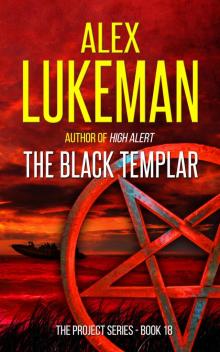 The Black Templar
The Black Templar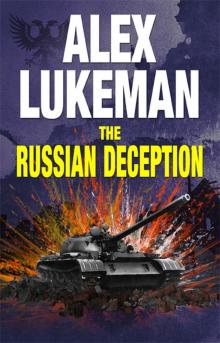 The Russian Deception
The Russian Deception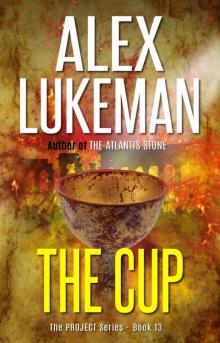 The Cup
The Cup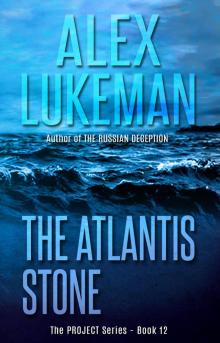 The Atlantis Stone
The Atlantis Stone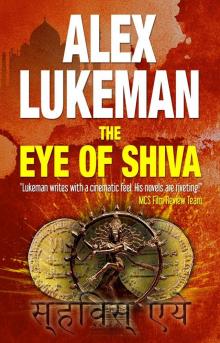 The Eye of Shiva
The Eye of Shiva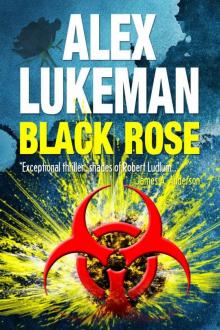 Black Rose (The Project Book 9)
Black Rose (The Project Book 9)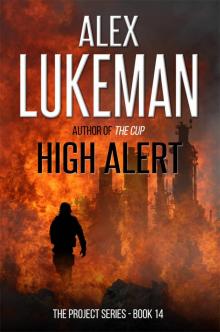 High Alert (The Project Book 14)
High Alert (The Project Book 14) Phoenix
Phoenix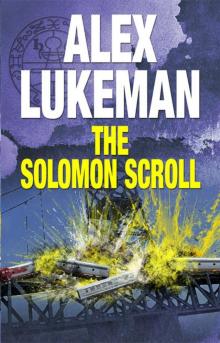 The Solomon Scroll
The Solomon Scroll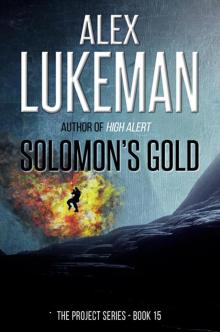 Solomon's Gold
Solomon's Gold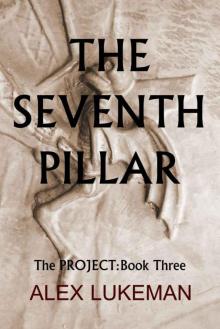 The Seventh Pillar
The Seventh Pillar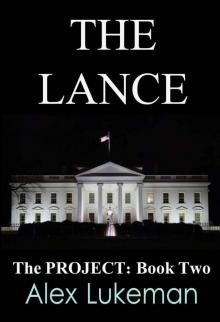 The Lance
The Lance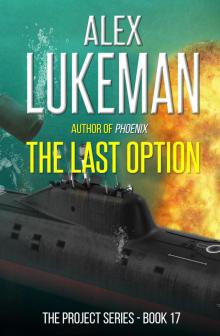 The Last Option
The Last Option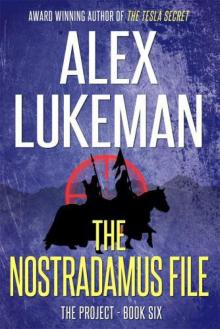 The Nostradamus File
The Nostradamus File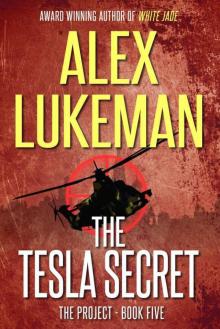 The Tesla Secret
The Tesla Secret